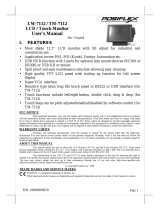
12 Rockwell Automation Publication 6176M-UM001D-EN-P - December 2012
Chapter 2 Installation
Installation Precautions
Read and follow these precautions before installing the monitor.
Environment and Enclosure Information
European Union Directive
This monitor meets the European Union Directive requirements when installed
within the European Union or EEA regions and have the CE mark. A copy of the
declaration of conformity is available at the Rockwell Automation website at
http://www.rockwellautomation.com/certification/overview.page
.
ATTENTION: This monitor is intended for use in a Pollution Degree 2 industrial
environment, in overvoltage Category II applications (as defined in IEC 60664-
1), at altitudes up to 2000 m (6561 ft) without derating.
This monitor is considered Group 1, Class A industrial equipment according to
IEC/CISPR 11. Without appropriate precautions, there may be potential difficulties
ensuring electromagnetic compatibility in other environments due to conducted as
well as radiated disturbance.
This monitor is supplied as open-type equipment. UL recognized and hazardous
location equipment must be mounted in an enclosure that is suitably designed or
rated for those specific environmental conditions that will be present, and
designed to prevent personal injury resulting from accessibility to live parts.
UL Listed equipment need not be mounted inside another enclosure in ordinary
(nonhazardous) locations if NEMA Type and IEC ratings are not required, but the
mounting method must limit the tilt of the product to no more than 30° from
vertical. The mounting means must be firmly attached to the supporting surface
using screws, bolts, or clamps so the monitor cannot tip.
All monitors ship with a gasketed bezel to meet specified NEMA and IEC ratings
only when mounted in a panel or enclosure with an equivalent rating.
Subsequent sections of this publication may contain additional information
regarding specific enclosure type ratings that are required to comply with certain
product safety certifications.
In addition to this publication, see the following:
• Industrial Automation Wiring and Grounding Guidelines, publication 1770-4.1
,
for additional installation requirements
• NEMA Standard 250 and IEC 60529, as applicable, for explanations of the
degrees of protection provided by enclosures
ATTENTION: This monitor is intended to operate in an industrial or control
room environment, which uses some form of power isolation from the public
low–voltage mains. Some computer configurations may not comply with the
EN 61000-3-2 Harmonic Emissions standard as specified by the EMC Directive of
the European Union. Obtain permission from the local power authority before
connecting any computer configuration that draws more than 75 W of AC power
directly from the public mains.





















